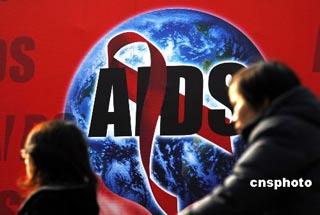(单词翻译:单击)
Today (27th) is the eighth National HIV Testing Day in the United States. It's estimated that a quarter of a million Americans who are infected with HIV do not realize it, and this knowledge could save their lives. Testing is a critical method to control the virus and HIV Testing Day is promoted around the world.

Today (27th) is the eighth National HIV Testing Day in
the United States. Testing is a critical method to control
the virus and HIV Testing Day is promoted around the world.
It's estimated the number of Chinese living with HIV/AIDS is about 700,000, a tiny drop of the ocean in a population of 1.3 billion.
Is there a need and is it practical to promote HIV testing in a country with the world's biggest population and perhaps one of the smallest affected groups?
Dr. Hans Troedsson, WHO Representative for China said "The importance of testing is that you need to know your status so you can seek care and you can get treatment, and also you can avoid exposing others for infection."
More than 70 percent of Chinese living with HIV/AIDS don't know they are infected. The virus is spreading from high risk groups such as drug users and sex workers to the general population. This calls for more prevention efforts, and testing is one of them.
Chen Zhu, Minister of Public Health said "We are promoting comprehensive voluntary counseling and testing. There are 4293 test points in the 31 provinces, municipalities and autonomous regions. More than one million people are tested annually. "
Setting up the infrastructure isn't just about delivering effective service.
Dr. Bernhard Schwartlander, UNAIDS China Office Representative said "I think it is important for every individual in the society to think about the risks of HIV infection, and the test should be part of that. It's not something isolated mechanic, it's part of thinking about one knows of thinking of risks of HIV infection and also how I would relate others with that. "
And it's more than the psychology and environment. China also has to deal with certain problems on the ground, which many developing countries share.
Professor Jing Jun of Tsinghua University said "The WHO's assumption against compulsory testing is that all hospital should take universal precautions. You should wear gloves, you should test the blood, and you should take surgery, you know doctors should be fully protected. But it’s not our case in our hospitals. If you run a test, an evaluation of universal precautions in Chinese hospitals, it's simply not there. So there is a Chinese reality to it."
Whatever the realities, testing as a prevention strategy is gaining momentum in China. The real question is how effective it can be.


